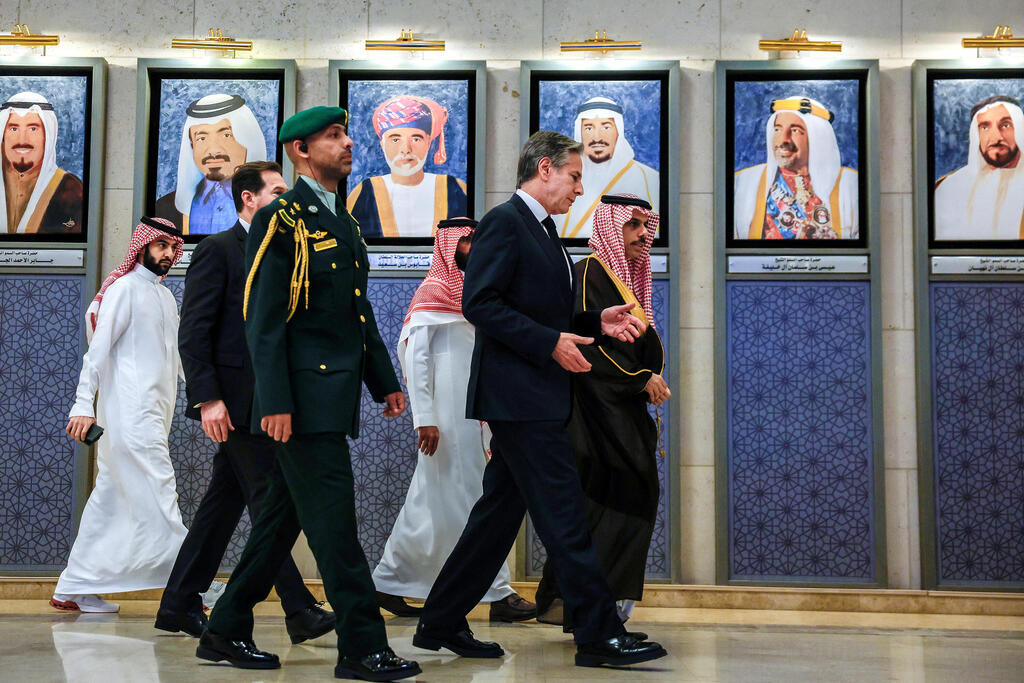Getting your Trinity Audio player ready...
In a strategic shift, some Western officials, while publicly advocating for calm in the north, are considering leveraging Israel's successful strikes against Hezbollah to diminish the group's political influence in Lebanon. This effort aims to break Hezbollah's stronghold on the country following the assassination of key leaders, primarily Hezbollah head Hassan Nasrallah.
Netanyahu's appeal to the people of Lebanon
(Video: GPO)
The Biden administration is encouraging Arab nations, such as Qatar, Egypt and Saudi Arabia, to collaborate on this initiative, the Wall Street Journal is reporting. This move is intended to weaken Hezbollah's grip, as reported by American and Arab sources. Recently, Washington reached out to Cairo and Doha, which have been involved in cease-fire efforts in Gaza since the war's onset and are now also engaged in discreet talks for stability in the north.
U.S. Secretary of State Antony Blinken, in discussions with leaders from these countries, requested their support in getting a new president elected for Lebanon, which is facing a severe political crisis alongside Israel's conflict with Hezbollah. Biden's special envoy to the region, Amos Hochstein, conveyed to Arab officials that the weakening of Hezbollah should be seen as an opportunity to resolve Beirut's political deadlock. Lebanese parties have struggled to agree on a new president since Michel Aoun's term ended in 2022.
This effort represents a quiet shift in the Biden administration's approach, following its recent calls for an immediate cease-fire. However, countries in the region are wary, fearing that pushing a presidential candidate could reignite internal conflict. Years of U.S.-backed reform efforts in Lebanon have only led to minor changes.
Qatar and Egypt are not on board
Lebanon's citizens suffer from sectarian and political divisions established during the French occupation after World War I, with elites from major groups – Sunni Muslims, Shiite Muslims, Christians and Druze –dividing government roles among themselves.
Riyadh-based sources indicate that the American initiative currently enjoys Saudi support. The oil-rich Gulf state has played a significant role in shaping Lebanon's state and economic actions in recent years. Conversely, Qatar and Egypt warn that this is a risky gamble. Officials in Cairo and Doha told senior American officials that the proposed plan is "unrealistic and even dangerous."
2 View gallery


Biden has a plan, Qatar and Egypt aren't convinced
(Photo: AP Photo/Susan Walsh, Ibrahim AMRO/AFP, רויטרס)
In conversations with these sources, they argued Israel would never succeed in destroying Hezbollah, and thus the terrorist organization must be part of any political settlement to the conflict. Egypt also expressed concern that attempting to intervene in Lebanese politics during an ongoing war could increase the risk of civil war in a country that has already suffered one in the past century.
The U.S. initiative also depends on key Lebanese leaders, including Prime Minister Najib Mikati and Lebanese Parliament Speaker Nabih Berri, a Shiite leader considered a "central conduit" in cease-fire negotiations with Hezbollah. If Washington succeeds in initiating a move, it will need to unify Lebanon's political factions to elect a new president.
The president of Lebanon serves as the commander-in-chief of the Lebanese army and is seen as crucial in establishing a competent government capable of addressing the current crisis. Mikati and Berri expressed support for electing a new president last week but also praised Hezbollah's "struggle against Israeli forces." Hezbollah's acting leader, Nasrallah's deputy Naim Qassem, rejected calls for a new political settlement while the war with Israel continues. However, he did not rule out a cease-fire independent of the Gaza Strip's situation.
Ynet analyst Ron Ben-Yishai notes that Qassem's statement agreeing to a cease-fire without preconditions was likely coordinated with Iran. Qassem, from Hezbollah's founding generation and a key spokesperson, is part of the jihad council. He is currently the highest-ranking member of Hezbollah's military-political leadership after Nasrallah's assassination and the attack on his intended successor, Hashem Safieddine.
In Lebanon, the president is elected by the parliament, which has 128 members. Currently, no party has enough strength to elect a president alone and without Hezbollah and its allies' support, forming a political consensus within Lebanese politics remains challenging.
Amid tensions in Lebanon, where hundreds of thousands have been displaced following the IDF's entry into southern Lebanon and massive air force strikes across the country, Israel also hopes to effect change. Evidence of this can be seen in a video released by Prime Minister Benjamin Netanyahu.
In his message to the Lebanese people, Prime Minister Benjamin Netanyahu urged them to seize the opportunity to liberate Lebanon from Hezbollah's control to prevent the country from descending further into destruction and chaos. He reminded them of Lebanon's past as "the pearl of the Middle East" and blamed Hezbollah and Iran for its current state of turmoil and war. Netanyahu claimed that Hezbollah's actions, including launching thousands of rockets at Israel, serve Iranian interests at Lebanon's expense.
He emphasized Israel's right to defend itself and declared that Israel will prevail in the conflict. Netanyahu appealed to Lebanese citizens to reclaim their country and restore it to peace and prosperity, warning that failure to do so would allow Hezbollah to continue its futile war against Israel, causing further suffering for all Lebanese people. He encouraged Lebanese families to consider whether the ongoing conflict is worth the cost, emphasizing the potential for a better future sans Hezbollah's influence.
Get the Ynetnews app on your smartphone:






